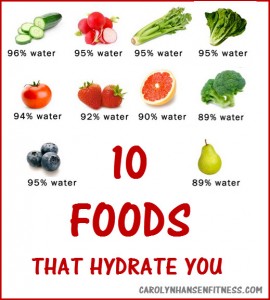 Your body cannot function properly without enough water and neither can mine. Our bodies are nearly 80% water and it is water that is used to transport oxygen, fat and glucose to your working muscles. It regulates body temperature, helps digest food and eliminate waste from our bodies.
Your body cannot function properly without enough water and neither can mine. Our bodies are nearly 80% water and it is water that is used to transport oxygen, fat and glucose to your working muscles. It regulates body temperature, helps digest food and eliminate waste from our bodies.
A properly hydrated body is mandatory. It affects our mind, our mood, our memory and our learning. Thinking and reaction time are all affected by how hydrated our bodies are.
“Even if you’re just mildly dehydrated, it can lead to mood changes and fatigue” says dietitian Kim Larson R.D.N. a spokesperson for the Academy of Nutrition and Diabetes.
Truth is, if we want to stay healthy we must stay hydrated.
Drinking fresh spring water is always a great choice but it is not the only choice nor the only way your body can receive the needed water/fluid it requires.
Fresh fruits and veggies can help fulfill your fluid requirements and also provide healthful nutrients such as minerals, vitamins, fiber and protein.
Fruits that you can turn to for high water content are:
Watermelon and strawberries: 92% water per volume
Grapefruit: 91%
Cantaloupe: 90%
Peaches: 88%
Cranberries, oranges, raspberries and pineapples all provide 87% while apricots come in at 86% and plums and blueberries are 85%. Apples and pears are 84%, grapes and cherries come in on average at 81% and bananas take last place everything off at 74% water.
Vegetables that provide high water content are:
Cucumbers and lettuce: at the top with 96% water
Zucchini, radish and celery: 95% water
Tomato: 94% water
Green cabbage: 93% water
Cauliflower, red cabbage, eggplant, peppers, and spinach all have 92% water while broccoli is 91% water by weight. Carrots come in at 87% and finishing off this list are white potatoes and peas with 79% water.
Because water-rich foods provide natural sugars, amino acids, mineral salts and vitamins (that we lose when we exercise), a study done by the University of Aberdeen Medical School claims that enjoying a nice slice of watermelon or eating a cucumber after an intense workout can actually hydrate your body twice as effectively as a glass of water.
This rich combination of nutrients and water hydrates you more effectively than any sports drink or plain water can and you’ll avoid the artificial flavors and colors that do nothing for your health or hydration.
Not only can eating high water content fruits and vegetables after your workout provide your body with needed nutrients and fluids, but high water content foods contain minimal calories while making us feel full a real boost to our diet.
Eating four healthy servings of fruits and five of veggies daily not only provides your body with the fluids it requires and helps with weight loss, but reduces your risk of cancer and other diseases.
It is true, foods with high water content like fruits and vegetables can help you lose weight.
Replace your high-calorie foods with water-based foods in order to subtract calories and fat from your diet. The only caution would be to pay attention to your fruit consumption (eat your daily needs) due to the high calorie content.
Adding seasonal fruits and veggies that are at least 90% water to your meals will aide you in your weight-loss war. It is a simple strategy that can work for anyone.
Studies done at the University of Tokyo showed that women who consumed high water content foods had smaller waistlines and lower body mass indexes. Researchers believe that the water contained in these foods is the reason because it helps fill you up so you end up eating less.
Eating fruits and veggies that are high in water content can help you lose weight by curtailing your appetite.
If you are failing to achieve your health and fitness objectives, then part of the problem may be that you are OVER-COMPLICATING your plan of action.
Let me help you get back on track. with my “Minimalist Exercise and Nutrition” program.
Speak Your Mind